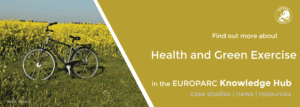Webinar: Healthy Parks, Healthy People Europe
Our Parks and Protected Areas are a health-promoting asset. They have a crucial role in nurturing healthy ecosystems which are good for nature and sustain our societies. In providing opportunities for people to experience and enjoy nature, they also support the mental, physical, emotional, spiritual and social health and well-being of people and communities across Europe.
Parks & Protected Areas as ‘Natural Health Centres’
Following the outcomes of the EUROPARC Conference 2019 in Latvia, the webinar ‘Healthy Parks, Healthy People Europe’ discussed the potential of Parks & Protected Areas as ‘Natural Health Centres’.
Three inspiring case studies have been presented by Deborah Prentice from Parks Victoria (Australia), Liesbeth Van Gysegem from Regional Landscapes Limburg (Belgium) and Paul Barclay from Cumbernauld Living Landscape (UK), and raised fruitful discussions with participants. The session was moderated by Peter Rawcliffe from Scottish Natural Heritage and Council member of EUROPARC Federation.
Watch the recording of the full webinar and download speaker’s presentations below:
Introducing the Jūrmala Communiqué
Pete Rawcliffe introduced the topic by highlighting the need to create a new model of health prevention, which places more emphasis on contact with nature. He introduced the EUROPARC Federation’s Jūrmala Communiqué resulting from the Conference in Latvia, and EUROPARC’s toolkit Health & Well-being Benefits from Parks & Protected Areas.
Healthy Parks Healthy People – The Australian Story
Deborah Prentice shared the experience of developing the original Healthy Parks Healthy People (HPHP) programme in Parks Victoria about 20 years ago, which has now become a worldwide movement to connect people to nature and increase their health and well-being.
Starting as a marketing tagline and followed by research and evidence on the strong link between nature parks and human health, the HPHP developed concrete partnership programmes and progressively spread around Australia and around the world. Watch the recording above or download Deborah’s presentation to read about the milestones, current initiatives and key focus areas of the Australian and global HPHP movement.
Download Deborah’s presentation
The Flemish Nature and Health network
Liesbeth Van Gysegem presented a case study from the Regional Landscapes Limburg – an NGO focussed mainly on protecting and strengthening nature and landscapes, but operating on crossroads with other sectors, such as education, tourism, agriculture, and health.
Within a project aiming to establish links between nature and health sectors, Regional Landscapes organised “Inspiration Days” for employees of nature, health and other organisations, and worked on finding stronger evidence on positive impacts of nature on human health and well-being. In March 2019, a network of 45 diverse partners from health and environmental sectors was launched to promote the role of nature in human health and to improve the accessibility to nature for the most vulnerable groups.
Download Liesbeth’s presentation
The Wild Ways Well programme in Cumbernauld, Scotland
Paul Barclay shared a case study from Cumbernauld, a new town that is perceived as highly urbanised and lacking green infrastructure. The Wild Ways Well project aims to get people suffering from, or at risk of, poor mental health out into their local green spaces and make use of the natural capital on their doorstep. Read the full case study here.
